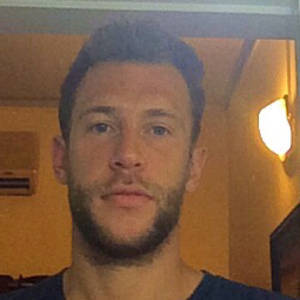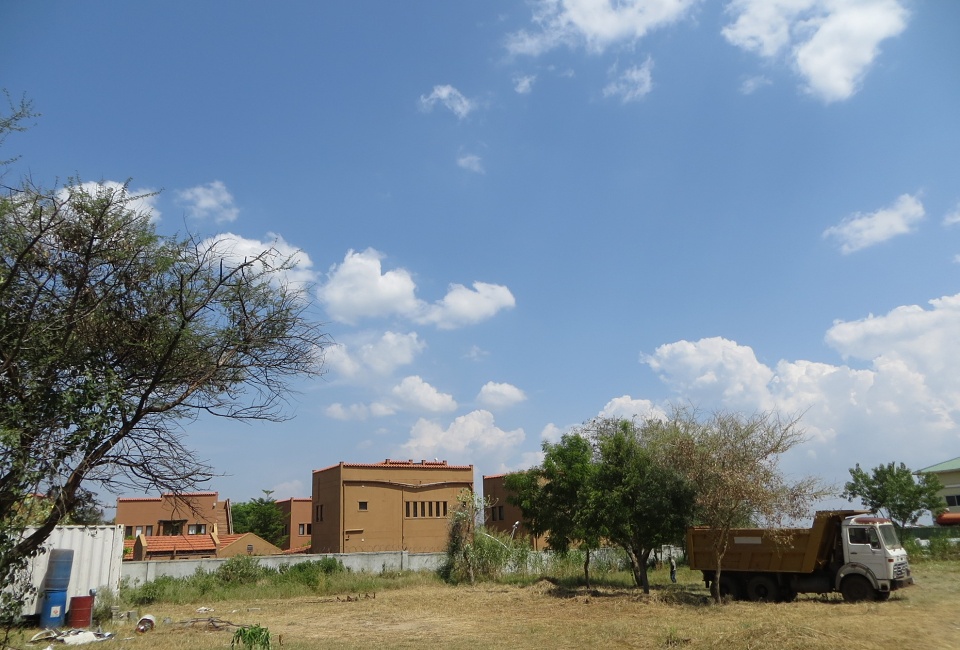Safe as (well guarded and fortified) houses
There’s a sense of unity against the criminality and insecurity in Juba. Compound managers allow other residents to tramp across the grass and underneath the acacias to move through a network of inner gateways away from the roads. There’s interest in knowing about the security situation when people return from far-flung corners of the country, some of which are pretty much out of bounds. Most organisations have their staff on fairly strict curfews and locals’ routines ensure they’re home by nightfall. Compounds, like the one pictured, end up being a sun-beaten mish-mash of securely parked HGVs, European ambassadors’ houses (the terracotta buildings that think they’re in Morocco) and barrels of scarce oil.
I’ve encountered petty bribery in several African countries, usually from border or traffic police. In Uganda I refused to give a rotund policewoman money for lunch when she stopped us on false accusations of not giving way. Crossing from Malawi to Zambia I had to bribe a border official in order not to ruin 18 teenagers’ safari after one of them hadn’t got his yellow fever jab and I tried to smuggle him through with a borrowed vaccination card.
In South Sudan it’s wise to be a little less cavalier when someone within the state apparatus stops you, due to the heavier presence of arms, and the increased sense of desperation exacerbated by poverty and inflation. We’ve been stopped twice by the traffic police on this trip. In Juba the dynamics of it were interesting. When you successfully produce your licence, insurance paperwork and fire extinguisher the policeman has to fabricate something in order to extract a bribe, in this case a fire extinguisher licence, which doesn’t exist. The policeman knows that we know that the whole routine is a farce, but has us over a barrel. We partially regain ground by noting we’re on our way to the Ministry we are aligned with and state that we will ask the Minister how to obtain a fire extinguisher licence as we are not clear. This briefly panics the policeman. We know the government has zero funds to pay salaries and the only option is extorting money from the public. We sympathise but don’t appreciate being accosted aggressively.
Our colleague and driver Sebit seethed at the daily injustice and ridiculousness he has to experience and how it made him feel about his country’s predicament. I realised as a foreigner, and this tallies with how I have felt on many occasions in many places, that the true meaning or impact of something is lost in cultural barriers and poor understanding of underlying tensions. This incident annoyed me so much less than it annoyed Sebit, which would be reversed completely in the UK, where I would be incandescent with rage if I experienced the merest hint of unprofessionalism in a policeman. Perhaps in South Sudan and elsewhere I view these incidents as a learning experience rather than something to fight against, and there are good arguments for removing yourself as a foreigner from things you can’t fully understand. My mind judges the behaviour of people and government in my own country more harshly than virtually everywhere else and that’s not a trait I appreciate in myself.
Juba Airport is hilariously chaotic – a temporary tent with minimal floor space per passenger. Floor physically collapsed in places. A literal scrum to check in. Baggage scrutinised by Ethiopian Airlines staff – pens tested, phones switched on, every zip undone – we think because of the current Ethiopian issues with the Oromo people and the risk of journalists and savvy social media users exposing government brutality. Excruciating bag searches to ensure we wouldn’t be able to scribble coded messages with a secret pen, yet the bag searcher played with the guy-in-front’s penknife, exposed the glinting blade, re-packed it for him, and waved him through. A mid-air knife attack seemingly less worrying than a tweet. Delicate sensibilities would struggle at Juba Airport. And potentially in South Sudan in general.
This region of Africa may be the most fascinating, troubled and complex place I’ve been to.


Comments
Sign in or get an account to comment.


